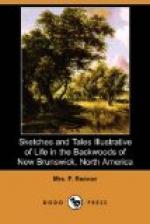trowsers are tightly strapped, and the little low-crowned
hat, with a streaming ribbon, is placed most jauntily
on his head. His axe is carried over one shoulder
and his jacket over the other, which in summer is
the common mode of carrying this part of the apparel.
Those who have been
lumbering may easily be
known among the others, by sporting a flashy stock
or waistcoat, and by being arrayed in “
boughten”
clothes, procured in town at a most expensive rate
in lieu of their
lumber. Little respect
is, however, paid here to the cloth, (that is, broadcloth),
for it is a sure sign of bad management, and most likely
of debt, for the back settlers to be arrayed in any
thing but their own home-made clothing. The grave
and serious demeanour of these people is as different
from the savage scowl of the discontented peasant,
murmuring beneath the burthen of taxation and ill-remunerated
toil, as from the free, light-hearted, and careless
laughter, both of which characterise the rural groups
in the fertile fields of England. New Brunswick
is the land of strangers; even the first settlers,
the “sons of the soil,” as they claim
to be, have hardly yet forgot their exile, a trace
of which character, be he prosperous as he may, still
hovers over the emigrant. Their early home, with
its thousand ties of love, cannot be all forgotten.
This feeling descends to their children, losing its
tone of sadness, but throwing a serious shade over
the national character, which, otherwise has nothing
gloomy or melancholy in its composition. There
is also a kind of “
looking a-head”
expression of countenance natural to the country,
which is observed even in the children, who are not
the careless frolicsome beings they are in other countries,
but are here more truly miniature men and women, looking,
as the Yankees express it, as if they had all cut
their “
eye-teeth.”
But here we are, for the present, arrived at the bourne
of our journey. High on a lofty hill before us
stands a large frame building, the place of worship
as well as the principal school-house of the settlement.
This double purpose it is not, however, destined long
to be devoted to, for the building of a church is
already in contemplation, and will, no doubt, soon
be proceeded with. The beaming sun is shining
with dazzling radiance on its white walls, telling,
in fervent whispers, that a shelter from the heat
will be desirable; so here we will enter, where the
shadowy trees, and bright stream glancing through the
garden flowers, speak of inhabitants from the olden
world. A frame building has been joined to the
original log-house, and the dwelling thus made large
enough to accommodate the household. Mrs. Gordon,
the lady of the mansion, and the friend I have come
thus far to see, is one of those persons the brilliance
of whose gem-like character has been increased by
the hard rubs of the world. She has experienced
much of Time’s chance and change—experiences
and trials which deserve relating at large, and which




